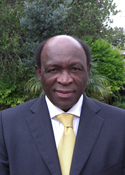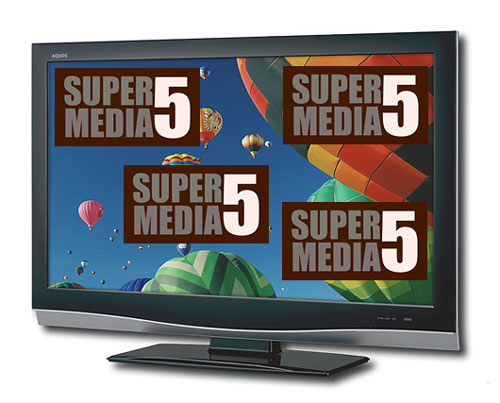Amid all the noise and fanfare surrounding On Digital Media’s launch last week of TopTV, another new pay-TV licensee, Super 5 Media, is quietly gearing up to launch services to SA consumers.
TechCentral can report exclusively that Super 5 Media plans to go live on 1 June and is targeting 400 000 subscribers in its first 18 months of operation — 200 000 on satellite and 200 000 receiving television services over cable.
However, a standoff with the Independent Communications Authority of SA (Icasa) over the issuing of a telecommunications licence could take some of the shine off its launch plans. And there’s a dispute brewing between majority shareholder Shenzhen Media and minority shareholders.
Super 5 Media has a radically different approach to the market than On Digital Media and incumbent MultiChoice, which operates DStv. “We are more a technology business than a traditional broadcaster,” says director Tian du Pisane. “We think linear broadcasts are boring.”
In addition to offering satellite services — which it plans to launch only at an unspecified future date — the company plans to offer television content over cable (copper and fibre) and to provide broadband Internet services.
It’s even secured a chunk of bandwidth — 2Gbit/s — on the Seacom undersea cable through a partner company, Information Bearing Signals, and will launch an Internet service provider business next month.
Super 5 Media has had a troubled birth. Formerly known as Telkom Media, the company has chewed through hundreds of millions of rand in investment with little to show for it so far.
Telkom was previously a majority shareholder but later decided broadcasting wasn’t an area into which it wanted to expand. This was despite the fixed-line operator sinking nearly R500m into the business.
Since Telkom sold its stake a year ago — for a “nominal sum” — Super 5 Media has consumed another R100m in operating expenses, despite the staff complement having been reduced from 140 to 50 through natural attrition and retrenchments.

The company is 75% held by Shenzhen Media, which acquired Telkom’s stake. In turn, Shenzhen Media, which has no relation to the Chinese-based company of the same name, is 80% held by Briss Mathabathe’s Imbani Holdings. The remaining 20% is in the hands of the Sino-African Development Group, a business owned and led by a wealthy and colourful Chinese businessman called Philip Xiao.
Videovision Entertainment (with a 15% stake), MSG Afrika (5%) and WDB Investment Holdings (5%) own the remaining shares, though it’s understood they play no active role in the business.
Mandla Ngcobo, a former Telkom executive, leads the company as CEO. Mathabathe chairs the board following the departure last year of Connie Molusi.
Unlike rival On Digital Media, Super 5 Media looks set to launch its services in phases, targeting hotels with an IPTV, or Internet Protocol television, offering from June. A residential pay-TV offering will only follow later.
Xiao says Super 5 Media will offer a service to select hotels in time for the 2010 soccer World Cup. It also hopes to begin providing IPTV soon thereafter to gated communities over Telkom’s broadband ADSL network and Neotel’s fibre infrastructure.
“We are far down the line in discussions with Telkom,” says Du Pisane. “We have some agreements in place already that give us access to Telkom’s network.”
Eventually, the company plans to build fibre infrastructure of its own, providing high-speed connections directly into people’s homes over which it will offer broadband Internet access and pay TV. “It’s expensive, yes, but it’s the only long-term solution,” Du Pisane says of the fibre roll-out plan.
Super 5 Media will offer five local channels at launch in June, including a news channel and a music channel. Other details, including pricing plans, are not yet available.
Before it can launch, though, Super 5 Media requires a telecoms licence from Icasa so that it can operate its own broadcasting network. Du Pisane says Icasa is withholding an individual electronic communications network service (I-ECNS) licence from the broadcaster.

“We want to do our own signal distribution,” Du Pisane says. “Icasa says we must have a signed shareholders’ agreement, but this is not a requirement under the law.”
It’s understood that a shareholders’ agreement hasn’t been finalised, at least in part, because of a dispute between Shenzhen Media and the minority shareholders, including Videovision.
Videovision CEO Anant Singh is travelling and was not immediately available to comment.
According to Du Pisane, Icasa is concerned that Super 5 Media may have non-SA shareholding of greater than the 20% foreign ownership limit set down for broadcasters under SA law. But, says Du Pisane, “we can clearly demonstrate to Icasa that we don’t have that problem”.
Icasa is expected to respond to a request for comment on Wednesday.
Du Pisane says the dispute with the regulatory authority won’t hold back Super 5 Media’s launch — he says it will go live on 1 June whether it has a network licence or not.
But the lack of a licence may affect the company’s ability to apply for a licence to provide digital mobile television. Icasa has asked interested parties to apply for these licences by no later than 7 May. However, prospective operators require an I-ECNS licence before they can apply.
Super 5 Media is also keen on digital terrestrial television (DTT). SA is migrating to DTT, though the process may be delayed because of government concerns over the technology standard the country has chosen. A delay could also affect the deadlines Icasa has set for licensing mobile TV operators.
Xiao says Super 5 Media believes it can provide 50 digital terrestrial channels for about R40/month. However, the company has been excluded from the first phase of digital trials. — Duncan McLeod, TechCentral
- Subscribe to our free daily newsletter
- Follow us on Twitter or on Facebook





